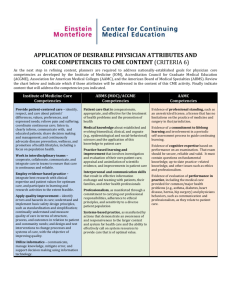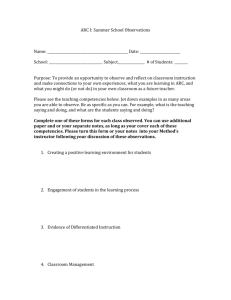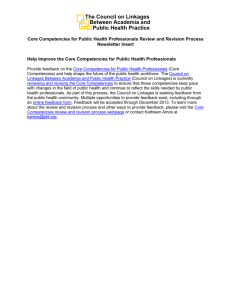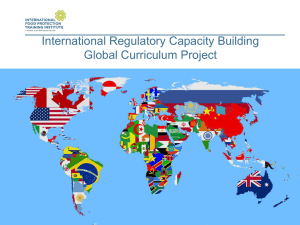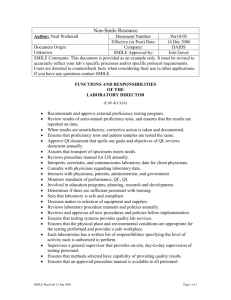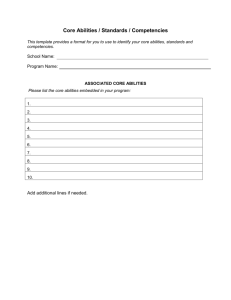BUSINESS SYSTEMS MANAGER
advertisement
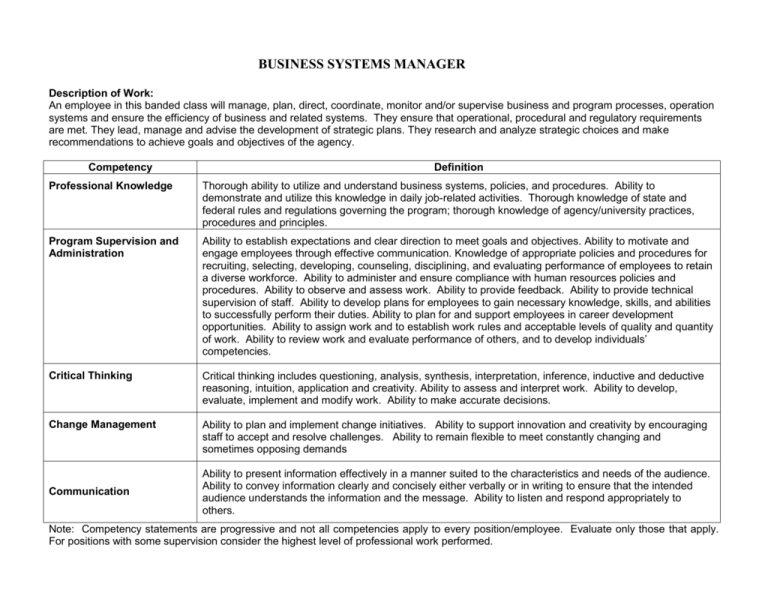
BUSINESS SYSTEMS MANAGER Description of Work: An employee in this banded class will manage, plan, direct, coordinate, monitor and/or supervise business and program processes, operation systems and ensure the efficiency of business and related systems. They ensure that operational, procedural and regulatory requirements are met. They lead, manage and advise the development of strategic plans. They research and analyze strategic choices and make recommendations to achieve goals and objectives of the agency. Competency Definition Professional Knowledge Thorough ability to utilize and understand business systems, policies, and procedures. Ability to demonstrate and utilize this knowledge in daily job-related activities. Thorough knowledge of state and federal rules and regulations governing the program; thorough knowledge of agency/university practices, procedures and principles. Program Supervision and Administration Ability to establish expectations and clear direction to meet goals and objectives. Ability to motivate and engage employees through effective communication. Knowledge of appropriate policies and procedures for recruiting, selecting, developing, counseling, disciplining, and evaluating performance of employees to retain a diverse workforce. Ability to administer and ensure compliance with human resources policies and procedures. Ability to observe and assess work. Ability to provide feedback. Ability to provide technical supervision of staff. Ability to develop plans for employees to gain necessary knowledge, skills, and abilities to successfully perform their duties. Ability to plan for and support employees in career development opportunities. Ability to assign work and to establish work rules and acceptable levels of quality and quantity of work. Ability to review work and evaluate performance of others, and to develop individuals’ competencies. Critical Thinking Critical thinking includes questioning, analysis, synthesis, interpretation, inference, inductive and deductive reasoning, intuition, application and creativity. Ability to assess and interpret work. Ability to develop, evaluate, implement and modify work. Ability to make accurate decisions. Change Management Ability to plan and implement change initiatives. Ability to support innovation and creativity by encouraging staff to accept and resolve challenges. Ability to remain flexible to meet constantly changing and sometimes opposing demands Communication Ability to present information effectively in a manner suited to the characteristics and needs of the audience. Ability to convey information clearly and concisely either verbally or in writing to ensure that the intended audience understands the information and the message. Ability to listen and respond appropriately to others. Note: Competency statements are progressive and not all competencies apply to every position/employee. Evaluate only those that apply. For positions with some supervision consider the highest level of professional work performed. Professional Knowledge - Thorough ability to utilize and understand business systems, policies, and procedures. Ability to demonstrate and utilize this knowledge in daily job-related activities. Thorough knowledge of state and federal rules and regulations governing the program; thorough knowledge of agency/university practices, procedures and principles. Contributing Journey Advanced 1. Considerable knowledge of business systems, theories, processes, rules and regulations and how they apply to technology in the applicable area(s); skills in applying this knowledge. 1. Full knowledge and understanding of business systems theories, processes, rules and regulations and how they apply to technology in the applicable area(s); skills in applying this knowledge. 1. Extensive knowledge of business systems, regulations and processes and their interaction and how they apply to technology in the applicable area(s); skills in applying this knowledge. 2. Applies considerable knowledge of local, state and federal regulations and statutes governing the area of work. 2. Applies full knowledge of local, state and federal regulations and statutes governing the area of work. 2. Applies extensive knowledge of local, state and federal regulations and statutes governing the area of work. 3. Applies knowledge of applicable business information systems, testing methodologies, training, business system analysis and/or other applicable systems 3. Full knowledge of applicable business information systems, testing methodologies, training, business system analysis and/or other applicable systems. Ensures integrity of information systems, internal controls and data, including recommending modifications as required. 3. Extensive knowledge of applicable business information systems, testing methodologies, training, business system analysis and/or other applicable systems. Fully understand the limitations of business information systems in relation to business processes. Assess and applies extensive knowledge of the reliability of systems and internal controls; identifies problems and changing requirements. 4. Basic knowledge of supervisory practices and skill in supervising others, including communication skills, how to delegate and assign duties, how to deal effectively with difficult employees, how to evaluate performance and to participate in disciplinary actions. Basic knowledge of state government’s Human Resources policies and procedures. 4. Full knowledge of supervisory practices and skill in supervising others, including communication skills, how to delegate and assign work, how to deal effectively with difficult employees, how to evaluate performance and may assist or conduct investigations and participate in disciplinary actions. Working knowledge of state government’s Human Resources policies and procedures. 5. Basic knowledge of strategic planning methodologies and practices. 4. Extensive knowledge of supervisory practices and skill in supervising others, including communication skills, how to delegate and assign work, how to deal effectively with difficult employees, how to evaluate performance and to conduct investigations and participate in disciplinary actions. Ability to mentor new supervisors. Full knowledge of state government’s Human Resources policies and procedures. 5. Considerable knowledge of strategic planning methodologies and practices. Basic knowledge - The span of knowledge minimally necessary to complete defined assignments. Full/Considerable knowledge - The span of knowledge necessary to independently complete defined assignments to produce an effort or activity directed toward the production or accomplishment of the research objective. Extensive knowledge - The broad scope of knowledge demonstrated on the job that is beyond journey competencies. Program Supervision and Administration Ability to establish expectations and clear direction to meet goals and objectives. Ability to motivate and engage employees through effective communication. Knowledge of appropriate policies and procedures for recruiting, selecting, developing, counseling, disciplining, and evaluating performance of employees to retain a diverse workforce. Ability to administer and ensure compliance with human resources policies and procedures. Ability to observe and assess work. Ability to provide feedback. Ability to provide technical supervision of staff. Ability to develop plans for employees to gain necessary knowledge, skills, and abilities to successfully perform their duties. Ability to plan for and support employees in career development opportunities. Ability to assign work and to establish work rules and acceptable levels of quality and quantity of work. Ability to review work and evaluate performance of others, and to develop individuals’ competencies. Contributing Journey Advanced 1. Assesses employee competencies and conducts/participates in performance management reviews. Coaches and mentors staff 1. Coaches and facilitates the enhancement of employee competencies as appropriate to the needs of the work unit. 1. Mentors, coaches and manages the total competencies of staff in multiple organizational units or region. Seeks sources and opportunities for employee training and growth. 2. Plans and assigns work tasks. Motivates employees and develops team commitment towards meeting the operational goals and objectives. 2. Manages resources effectively to provide for employee training and growth, to meet the operational goals and objectives. 2. Directs the management of program and staff resources. 3. Identifies and addresses quality of work and performance improvement issues for the unit. 4.Reviews work and written reports to ensure compliance with standards and requirements; guides staff in providing appropriate documentation to support conclusions. May conduct and prepare work and written reports. 3. Addresses quality monitoring and performance improvement issues for the program or area of responsibility. 4. Reviews and approves work findings /written reports, often of moderate complexity. Ensures that rules and regulations are interpreted correctly. 3. Involves employees in strategic planning and implementation and in the development of policies and procedures. Identifies and addresses quality monitoring and performance improvement issues for services for the program or area of responsibility for multiple units or region. 4. Reviews and approves documents and reports more complex or unique issues and effectively articulates written conclusions. Ensures that rules and regulations are interpreted correctly, internal and external to the organization. Critical Thinking Critical thinking includes questioning, analysis, interpretation, inductive and deductive reasoning. Ability to assess and interpret work. Ability to develop, evaluate, implement and modify work. Ability to make accurate decisions. Contributing 1. Makes determinations based on facts Identifies problems, reports potential problems, and assesses options. 2. Interprets delivery of service and compliance with local, state and federal regulations and standards. 3. Identifies risk impact on program policy and procedure issues. Journey 1. Analyzes moderately complex situations. Recommends solutions and options; alerts leadership to impact on program. 2. Recommends response to a moderately complex situation based on interpretation of local state and federal regulations and standards. 3. Recommends modifications to program policy and procedures to minimize risk. Advanced 1. Manages complex work situations. Anticipates and remains alert to potentially problematic situations. Resolves unusual problems. 2. Implements response to a situation based on interpretation of local state and federal regulations and standards. 3.Ensures implementation of program policy and procedure changes. Change Management Ability to plan and implement change initiatives. Ability to support innovation and creativity by encouraging staff to accept and resolve challenges. Ability to remain flexible to meet constantly changing and sometimes opposing demands. Contributing Journey 1. Understands change management strategies and principles. 1. Leads a transition from old to new programs at the unit level. Communicates and implements new policies and procedures. Participates in the development and implementation of goals and objectives. Advanced 1. Leads the development and implementation of vision and mission statements. Leads and directs the development and implementation of goals and objectives. Communication Ability to present information effectively in a manner suited to the characteristics and needs of the audience. Ability to convey information clearly and concisely either verbally or in writing to ensure that the intended audience understands the information and the message. Ability to listen and respond appropriately to others. Contributing Journey Advanced 1. Communicates with individual work units or entire organization on program elements. Updates existing communications. 1. Communicates moderately complex programmatic information outside of the organization. Interprets rules and regulations internal to the organization. 1. Communicates major and/or complex situations and actions, internal and external to the organization. Interprets rules and regulations internal and external to the organization; serves as a technical resource in developing response to the media. 2. Reviews and approves written reports, often of moderate complexity. Ensures that rules and regulations are interpreted correctly. 2. Documents and reports more complex or unique issues and effectively articulates written conclusions. Ensures that rules and regulations are interpreted correctly, internal and external to the organization. 3. Reviews and approves written reports, often of moderate complexity. Ensures that rules and regulations are interpreted correctly. 3. Develops and maintains professional working relationships in complex and/or difficult situations in order to achieve organizational goals. 2. Disseminates information on changes in policies, procedures, and protocols. 3. Prepares, organizes and may review written reports according to documentation standards and requirements; guides staff in providing appropriate documentation to support conclusions. 4. Acquires basic understanding of working relationships with co-workers and others in order to achieve work goals. 4. Develops contacts and relationships with interested parties in achieving division/organizational goals. Minimum Training and Experience Guidelines: Four year degree in Accounting, Business, Finance or closely related degree to the area of assignment and three years of progressive experience of which at least one is supervisory; or an equivalent combination of training and experience. Special Note: This is a generalized representation of positions in this class and is not intended to identify essential work functions per ADA. Examples of competencies are primarily those of the majority of positions in this class, but may not be applicable to all positions.
